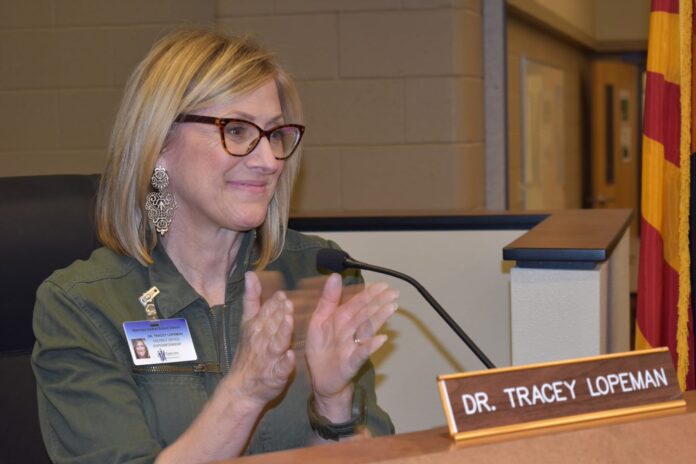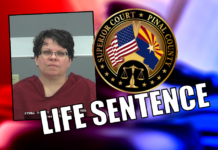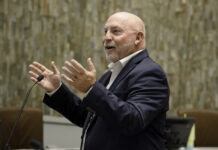
2021 has been a whirlwind of a year for the Maricopa Unified School District. The public school system saw the passage of the MUSD Override measure in November, which will keep class sizes small and technology up to date. There’s also the construction of a new high school, Desert Sunrise, which will open in July.
Any of these singular developments would make for a busy year.
But throw in the difficulties associated with the COVID-19 pandemic, and that complicates matters even further.
The district welcomed back 8,000 students to in-person learning during the COVID-19 pandemic, a challenge that seems to evolve with each passing day.
Dr. Tracey Lopeman, the superintendent of Maricopa Unified School District, has shepherded the school system through these turbulent times.
Getting students back in school was a huge step toward normalcy, but it didn’t happen overnight. Lopeman explained the process began in 2020. The MUSD Governing Board voted to allow parents the choice of whether to resume in-person learning. Half the families decided to send their kids back to school, while the other half continued virtual learning.
“We were ready for the return because our board was very clear last year about giving families a choice,” Lopeman said. “We spent the fall of 2020 working out the kinks, working on our communication systems while working on our approaches to mitigating spread.
“When we came back this year, we already had systems in place, and had experience with positive COVID cases, whether among staff or among students, on how to manage that. So, we were ready to work through those obstacles.”
The health issues concerning the coronavirus were difficult in and of themselves, but there were other challenges brought on by supply-chain issues.
“There was a lot of time spent on procuring supplies for pandemic management — hand sanitizer and masks,” Lopeman said.
Another challenge has been the worker shortage, which extends beyond the educational field, Lopeman explained.
“It isn’t just affecting our industry,” Lopeman said. “It’s everywhere.
“We’re still searching for and adding strategies for our workforce. We just don’t have very many applicants for the vacancies that we have in our schools. We have to respond to the fact that we don’t have guest teachers to the same degree that we had before the pandemic, and that’s a drain on our staff. We’ve come up with more strategies, and more options, so that we can educate kids and still be a good quality place of work.”
One of those strategies has been to start a new initiative, the “Grow Your Own Teacher Program,” where MUSD is developing its own teachers by, for example, helping instructional assistants get the education they need to become fully certified teachers.
“We’ve successfully moved nine classified staff members, instructional assistants and paraprofessionals into the certified ranks. These are people who love Maricopa,” Lopeman said.
Passage of the override looked to be in question on election night in early November. The early tabulations had the measure failing, but there were a lot of ballots turned in the days before Election Day, a total of more than 1,700, where the difference was made up and surpassed.
“I think what pushed us over the finish line was great work by our volunteers over the last week prior to Election Day,” Lopeman said. “There were a lot of public and private conversations that people had about what a vibrant education system means for the city of Maricopa, and how important MUSD is in our city.
“I think a point about the override was that it was promises made and promises kept,” Lopeman said. “And those promises were around class size, technology and the RAM Academy. We did those things. That’s documentable.”
The override originally passed in 2016, so voters also had statistics to consider — with the chief number being graduation rates. In 2016, the MUSD graduation rate was 69%. Now it’s 80%.
“The override also helps our teachers with small class sizes, and that helps teacher retention as well,” Lopeman said. “That’s one of the benefits of passing the override and maintaining low class sizes, we have more teachers who choose to continue their careers with us.”
In 2017, 82% of MUSD teachers had at least four years of experience. In 2020, that number improved to 91%.
The district celebrated a big victory in July when the Arizona State Legislature approved a second allocation, a grant of $18 million, for the construction of Desert Sunrise High School.
“Well, I think we had some legislators, like Bret Roberts, who understood the reality of the funding formula for new construction, and truly how limiting it was,” Lopeman said.
“Construction costs were just escalating overnight, and the second allocation almost doubled our funding for the high school. It was people going to bat for the city of Maricopa and the kids of MUSD. That did not happen by chance. We had some people looking out for us.”
The second burst of funding brought the state’s commitment for the school to $41 million.
“That allows us to move into phase two of the high school,” Lopeman said. “Not only building more but outfitting that original classroom building. It’s about 52 classrooms in our classroom building. That was going to be a shell. But with this second allocation, we were able to completely outfit it, the teaching stations, the technology, the furniture. And then we added a Student Services Building and a Student Commons Building¬¬ that has the media center and a lecture hall and some other gathering spaces.”
The past year was a busy one, but, as Lopeman explained, many people helped.
“All that happened during the pandemic,” Lopeman said. “It’s not like we could stop visualizing and working toward something that our kids really deserve. Our board is not the board that kind of kicks the dirt and says, ‘Aw, shucks, I guess it didn’t work out this time.’ They work to figure out plan B and keep moving forward, keep striving for that vision, keep striving for what the kids of this city deserve.
“And so that’s what we did. Those are the kinds of outcomes that occurred amidst some pretty significant challenges.”

![3 things to know about the new city budget Vice Mayor Amber Liermann and Councilmember Eric Goettl review parts of the city's 2024 operational budget with Mayor Nancy Smith on April 24, 2024. [Monica D. Spencer]](https://www.inmaricopa.com/wp-content/uploads/2024/04/spencer-042424-preliminary-budget-meeting-web-218x150.jpg)






![MHS G.O.A.T. a ‘rookie sleeper’ in NFL draft Arizona Wildcats wide receiver Jacob Cowing speaks to the press after a practice Aug. 11, 2023. [Bryan Mordt]](https://www.inmaricopa.com/wp-content/uploads/2024/04/cowing-overlay-3-218x150.png)



![Alleged car thief released without charges Phoenix police stop a stolen vehicle on April 20, 2024. [Facebook]](https://www.inmaricopa.com/wp-content/uploads/2024/04/IMG_5040-218x150.jpg)

![3 things to know about the new city budget Vice Mayor Amber Liermann and Councilmember Eric Goettl review parts of the city's 2024 operational budget with Mayor Nancy Smith on April 24, 2024. [Monica D. Spencer]](https://www.inmaricopa.com/wp-content/uploads/2024/04/spencer-042424-preliminary-budget-meeting-web-100x70.jpg)


